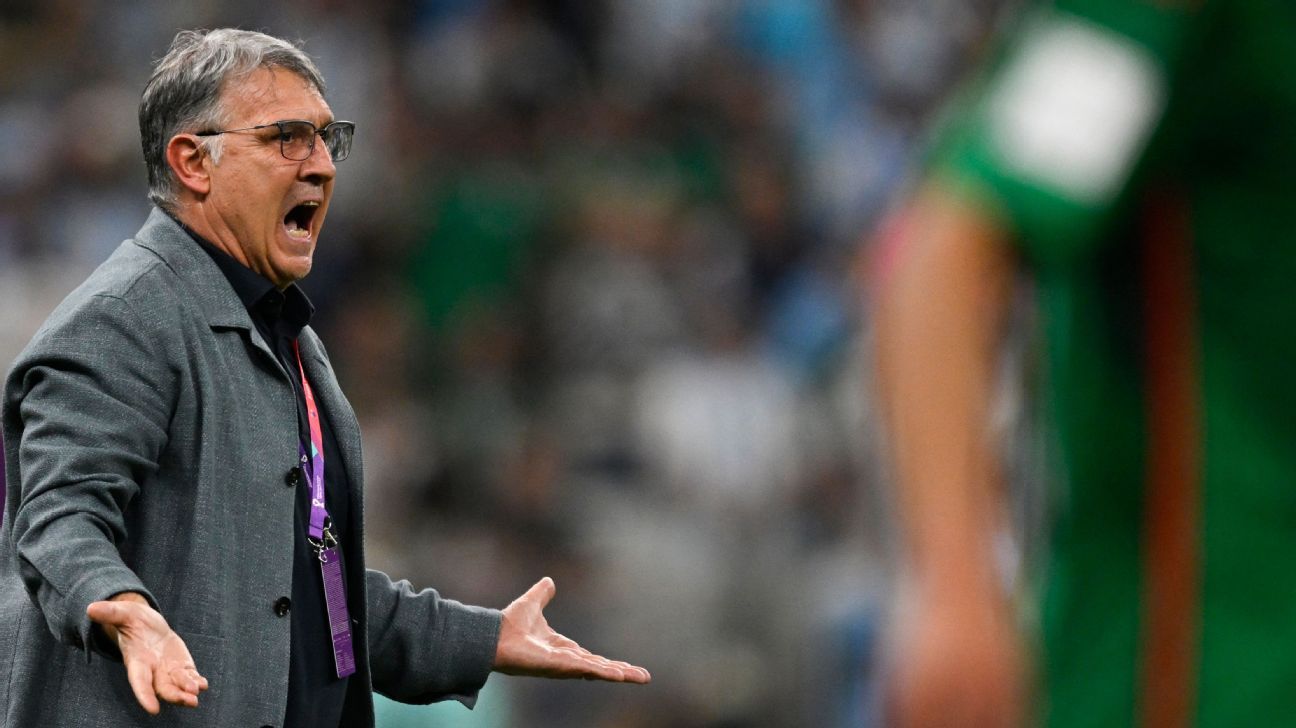Products You May Like
Former Mexico coach Gerardo “Tata” Martino has expressed worries about the country’s outlook for the sport.
“I believe that there are pieces that set off or sound the alarm [in Mexican soccer], undoubtedly I’m convinced that it’s so,” said the Argentine manager in an appearance on the Olfato de Gol podcast.
– Stream on ESPN+: LaLiga, Bundesliga, more (U.S.)
Martino, who left Mexico immediately after his contract ended in a disappointing group stage exit from the 2022 World Cup, lamented issues such as a lack of opportunities for youth in Liga MX, the difficulties to move domestic players to Europe, high transfer fees and the return of up-and-coming prospects to Mexico’s top flight from abroad.
“This is something that we, beginning with our second year [in 2020], began to talk with the people who were involved in these situations,” Martino said. “About the characteristics of how the [Liga MX] season was, the greater or lesser possibilities that were given to academy players, especially taking into account the great investment that there is in academies and the great investment that the [Mexican] federation makes to have the boys of the U15, U17 and U20 constantly training and competing.”
The former El Tri coach said that he found that there were “few possibilities” for young players in Liga MX, despite the success that many had in youth national teams. He was also baffled about the inflated transfer fees that often wind up being obstacles for domestic player transfers to Europe.
“How is it that the Mexican transfer market has players internally worth eight, ten or 12 million dollars and those same players have no outlet abroad?” Martino asked. “The value here is one and abroad it practically doesn’t exist.”
As for those that do go to Europe, Martino said he felt some were not given enough time to first establish themselves in Liga MX. Specifically, he noted the cases of 20-year-old dual-national Santiago Munoz (returned to Santos Laguna after a loan with Newcastle United) and 22-year-old Diego Lainez (on loan with Tigres from La Liga’s Real Betis).
“Many times there’s talk of players that at a young age or without much experience in the first division go to European soccer, but rarely do the alarms go off when these players, two or three years [later], are back in the Mexican market,” said Martino, who pinpointed Ajax’s Edson Alvarez and Espanyol‘s Cesar Montes as Mexican national team figures who were given ample time to develop in Liga MX first.
“The more opportunities young players have, the more nourished the national team will be.”
Martino admitted that the process to change the current situation is a complicated one because there needs to be shared opinions and desires for change from the “many components” and “influence” that surrounds the sport in Mexico.
“The level of controversy or the path of controversy seems to start and end with the [national team] coach in turn, right? I think it goes much deeper than this,” Martino said.
Changes could soon happen after a lengthy list of proposals were made by Liga MX president Mikel Arriola in February. Among those proposals were a return to eight Liga MX playoff spots instead of 12, dropping the number of foreign players per roster from eight to seven, a push to bring back promotion and relegation, ending the practice of single entities owning more than one club, creating a new trophy for the team with the highest total points over a full year and facilitating more transfers abroad for players.
Club owners will vote whether or not to approve these proposals and the new blueprint in May.
Later in the interview, Martino, who is currently out of work, also praised MLS where he managed Atlanta United in their inaugural 2017 season and in their MLS Cup title run in 2018.
“I notice a desire to have a very competitive league, to improve it year after year, and then what I also notice is the fact that American soccer players are exported to Europe, it’s something that’s part of the development policy. Undoubtedly that’s good for the [United States men’s] national team,” Martino said. “More and more transfer to Europe and you have them playing in the best teams in the best leagues in Europe.”
Martino commended the parity in MLS and the different projects developing, but had mixed emotions when asked about the lack of promotion and relegation in the league.
“I’m more used to tournaments where there is relegation. Obviously, the characteristics of MLS are very particular in that sense. Let’s say that promotion comes hand in hand in the creation of new franchises, because this also shows that it’s a league that’s still in development,” said the Argentine coach.
“The topic of franchises and the owners and the investment they make there, it’s difficult.”
During his time as Mexico coach from 2019 to 2022, Martino claimed a Gold Cup title in his first year before eventually failing to live up to expectations with losses to the United States in the inaugural CONCACAF Nations League final and the 2021 Gold Cup final.
A handful of narrow results in World Cup qualifying put additional pressure on the manager and the national team that bowed out in the group stage of Qatar 2022.
Before coaching Mexico and Atlanta United, Martino managed Barcelona, Argentina‘s national team, Paraguay‘s national team and several South American clubs.
